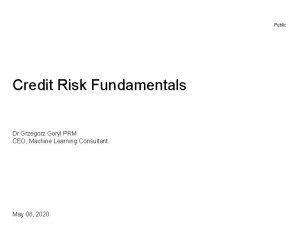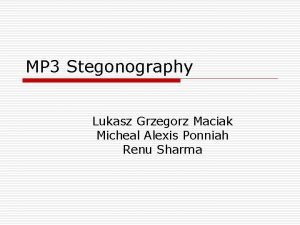Accounting system in Poland Anna Misiewicz Grzegorz Klementowski















- Slides: 15

Accounting system in Poland Anna Misiewicz, Grzegorz Klementowski, Łukasz Kaczyński Neisse University- Information and communiation management

History http: //www. rootsweb. ancestry. com/~instjose/immigration/poland/Backup/polish_records_backup. html

Accounting development in Poland • 1997 -2000 The Accounting Act of September 29, 1994, brought Polish accounting more in line with the European Union accounting directives, 2 implemented selected International Accounting Standards (IAS), and allowed Polish companies listed on foreign capital markets to use IAS or U. S. Generally Accepted Accounting Principles (US GAAP) instead of Polish regulation.

Accounting development in Poland • 2001 - 2004 New terminology and significant changes • Fair value concept • Substance over form • Consolidation (valuation of assets of the acquirer, purchase accounting method) • Investments (valuation of investments and financial instruments, main categories of investments) • Long-term contracts • Inventory and CGS valuation • Lease (definition, valuation, and profit determination

Accounting development in Poland • 2005 - 2008 On May 1, 2004, Poland became a Member State of the European Union. Membership entailed incorporating EU accounting legislation, including the requirement for companies listed on European stock markets to prepare their consolidated accounts according to the IAS/IFRS beginning in 2005

Accounting development in Poland • 2009 - … In 2009, the soft law related to the establishment of the supervisory board's auditing committee was replaced by a hard law. The Act of 7 May 2009 on certified auditors, their self-government, entities authorized to audit financial statements, and public supervision formally requests the establishment of an audit committee within supervisory boards. The responsibilities of the audit committee include oversight of financial reporting, internal control systems, internal audit and risk management, oversight of external audit, and verification of auditor independence. The audit committee also recommends the firm be employed as external auditor. This regulation can be seen as just another step in adjusting the

Accounting laws in Poland • Act of 29 September 1994 on Accounting No 121, item 591) is the basic legal act regulating the acco principles in Poland. • It has been in force since 1 January 1995 • It is the legal basis for accounting • It is customary to call it the Polish balance sheet law. • National and International Accounting Standards and Financial Reporting • Act on statutory auditors and their self-government • Tax laws - Law on business freedom

Accounting laws in Poland • Other legal regulations. Business entities in Poland. • Amendment of the Act • The Accounting Act was amended several times to align with EU regulations • Act of 9 November 2000 amending the Accounting Act no 113 item 1186. • Changes to the amendment can be divided into several major groups: • valuation adjustments • adjustment of rules of classification of events and valuation principles • correction of the ledger account list • the effects of the mistakes made in previous years

Entities governed by the Accounting Act • Commercial companies (personal and capital, including in organization) and civil partnerships, subject to point 2, as well as other legal entities, with the exception of the Treasury and the National Bank of Poland; • Natural persons, civil partnerships of natural persons, natural partnerships, if their net revenues from sales of goods, products and financial operations for the previous financial year equaled at least the equivalent in Polish currency of EUR 1 200 000; • organizational units operating under the Banking Law, regulations on trading in securities, regulations on

Entities governed by the Accounting Act • municipalities, counties, voivodeships and their unions • organizational units not having legal personality, except for the companies referred to in points 1 and 2; • branches and representative offices of foreign entrepreneurs within the meaning of the provisions on freedom of economic activity; • units not mentioned in points 1 -6, if they receive for the performance of tasks assigned to grants or subsidies from the state budget, budgets of local government units or special funds - from the beginning

Strucuture of the accounting act • Chapter 1. General provisions • Chapter 2. Keeping books • Chapter 3. Inventory • Chapter 4. Valuation of assets and liabilities and determination of financial result • Chapter 5. Financial statements of the entity • Chapter 6. Consolidated Financial Statements of the Capital Group • Chapter 7. Examination and publication of financial statements • Chapter 8. Data protection • Chapter 8 a. Service bookkeeping • Chapter 9. Criminal liability • Chapter 10. Special and transitional provisions • Chapter 11. Changes to existing regulations, final provisions

Financial Statements All the accounting reports and statements in Poland must be written in Polish language and counted in Polish currency.

Balance sheet Changes in the position of the statement of financial position of the PKO Bank Polski SA Group (PLN milions) 30. 09. 2014 Structure 30. 09. 2014 31. 12. 2013 Structure 31. 12. 2013 Change in per cent Cash, money in the central bank 8636, 8 3, 5% 7 246, 1 3, 6% 19, 2 Loans from banks 3153, 2 1, 3% 1 893, 4 1, 0% 66, 5 Loans and advances to customers 178 33, 3 73, 0% 149 623, 3 75, 1% 19, 2 Securities 40 634, 4 16, 6% 29 795, 7 15, 0% 36, 4 Other assetsw 13 689, 2 5, 6% 10 672, 6 5, 4% 28, 3 Total assets 224 227, 0 100, 0% 199 231, 1 100, 0% 22, 7 Liabilities to banks 19 776, 1 8, 1% 3 751, 4 1, 9% 5, 3 x Commitment to customers 171 173, 6 70, 0% 151 904, 2 76, 2% 12, 7 Securities issues and subordinated liabilities 15 353, 2 6, 3% 12 167, 3 6, 1% 26, 2 Liabilities due to insurance business 2 637, 7 1, 1% - 0, 0% X Other liabilities 8 505, 0 3, 5% 6 253, 9 3, 1% 36, 0 Sum of liabilities 217 444, 7 89, 0% 174 076, 8 87, 4% 24, 9 Total equity 27 002, 3 11, 0% 25 154, 3 12, 6% 7, 3 Sum of liabilities and equity 224 447, 0 100, 0% 199 231, 1 100, 0% 22, 7%

Profit and loss statement + Net revenue from the sale of materials, goods and services Gains / losses on sales - Cost of products and materials sold Gains / losses on sales = Gains / losses on sales + Other operation incomes Gains / losses on sales - Other operating cost Gains / losses on sales = Profits / losses from operating activities Gains / losses on sales + Financial income Financial activity - Financial costs Financial activity = Profit/loss gross Financial activity - Tax = Profit/loss net Tax

Dziękujemy Thank You Děkujeme Danke schön




























